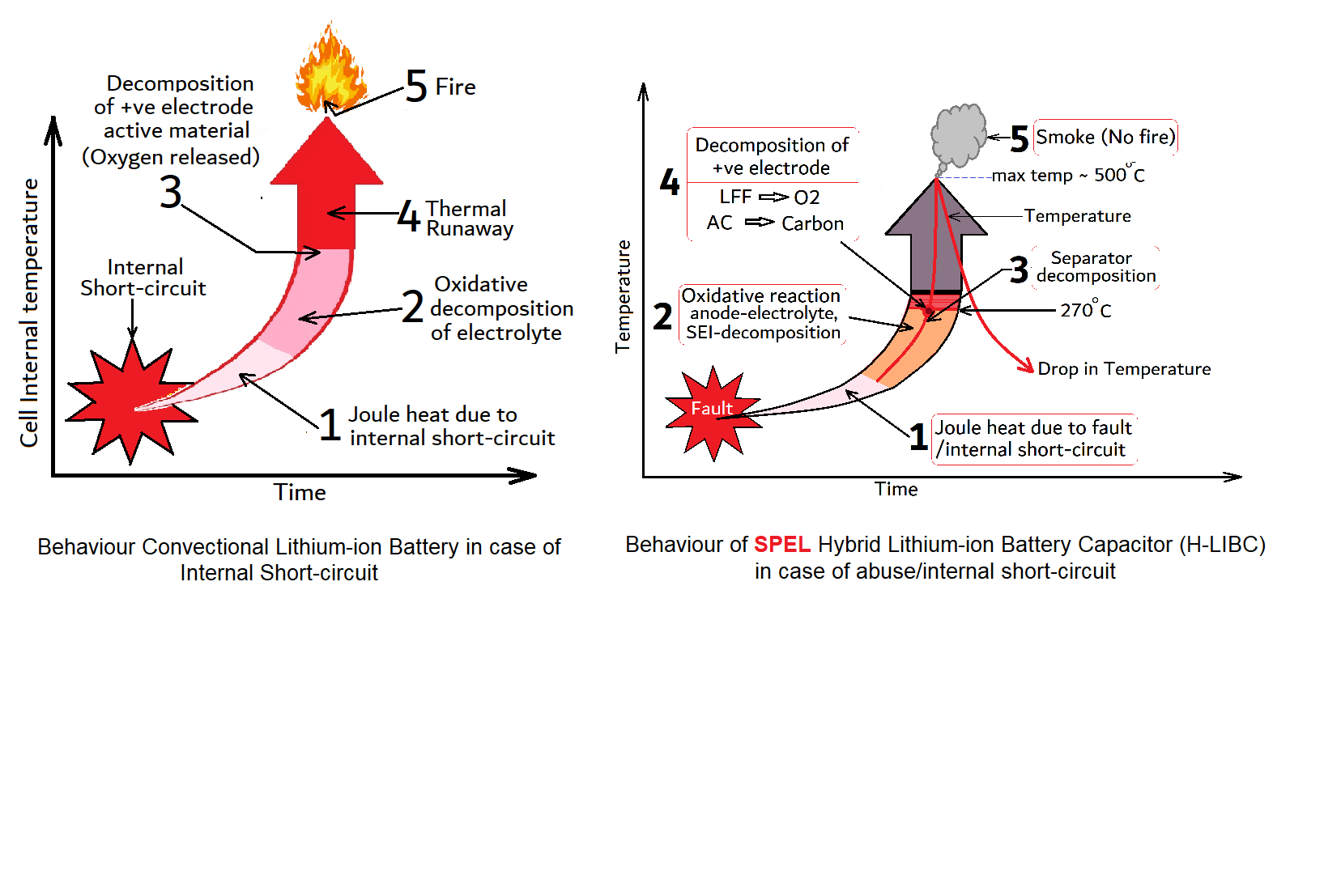Introducing an International Patented (US20220277903 A1 and WO2019217039 A3) Product Hybrid
Lithium Ion Battery Capacitor (H-LIBC) that features the highest energy density upto 65 Watthours per kilogram.
SPEL Hybrid Lithium-ion Battery Capacitor (H-LIBC) is a hybrid energy storage device, classified as an electrochemical device having desired features of Supercapacitor and battery
in single device.
SPEL H-LIBC is Generation Next hybrid energy storage cell that combines the advantages of both the LIB and the LIC, thereby avoiding their inherent defects, while bridging the
gap between the high energy densities offered by batteries and the high power densities seen in EDLCs. The energy density and power density of SPEL's hybrid cell can be designed
to meet the requirements by a reasonable distribution of the ratio between LIB and LIC electrode materials in this internal hybrid cell.
SPEL H-LIBC is tailored by composite ratios within the cathode and prelithiated SPEL proprietory Anode of LIC, to fit different applications based on their requirement of power density and energy density.
SPEL H-LIBC's operating voltage of 3.8 to 2.2V and can provide
over 10X more energy density than a conventional Supercapacitor (EDLC), and a projected life cycle of over 100,000 Charge-Discharge
SPEL Hybrid Lithium-Ion Battery Capacitor Unique features
SPEL H-LIBC 9000F pouch cell features
over 65 Watthours per kilogram of specific energy density, and Powerdensity of 4 to 5 Kilowatt per Kilogram.
SPEL H-LIBC's Cathode is composite of Activated Carbon and LIB active material and Anode is of LIC, graphitic pre-lithiated. SPEL LIC Pre-Lithiated anode features
Patented (US 10755867) Method of Negative Electrode
Pre-Lithiation that increases capacitance and lowers internal resistance.
SPEL H-LIBC cells are thoroughly tested for capacity, internal resistance, cycle life, and temperature range performance. A critical performance test includes the high temperature
and high voltage DC-life test: The H-LIBC cell is held at 3.8 V for 2000 continuous hours in 65° C heat. Results indicate that SPEL H-LIBC cells have consistently exceeded this benchmark by retaining 90% of
initial capacitance after 2000 hours.
Rapid Charging and High Power Capability
SPEL H-LIBCs can be fully charged in minutes, and also haves capability to deliver high power in seconds (Power density is typically 4.5 kW per kg.)
Lower Self-Discharge than Lithium-ion Batteries
SPEL H-LIBCs also have a low rate of self-discharge, with less than 5% voltage drop from maximum charge when idle over a three month period.
Wide Operating Temperature range
SPEL H-LIBCs are reliable in a wide temperature range
Patented (US 10121605 B2) of -60°C to 65°C .
Safety from fire/explosion
Unlike Lithium-ion Battery, the thermal runaway event incase of SPEL H-LIBCs
does not end with fire and explosion because the positive electrode of SPEL H-LIBC is combination of Lithium metal oxide and activated carbon and in case of internal short-circuit or abuse, the released ratio of hydrocarbon gases and O2 is less and that of CO and CO2 is dominant during the reaction at thermal runaway peak-point. Due to this sitiuation, the thermal runaway reaction in SPEL H-LIBC ends up in
gasification and not combustion/fire.
SPEL Hybrid Lithium-ion Battery Capacitor can be charged in minutes, and is inherently safer to use than convectional lithium-ion batteries.
SPEL's H-LIBCs can be used as a stand-alone, to power various demanding applications like
Electric Mobility, Wind Turbines, Mass Transit, Hybrid Cars, Consumer Electronics, Defense & Aerospace, Load levelling, Medical and Industrial equipment applications.
SPEL's H-Series Lithium-ion Battery Capacitors (H-LIBCs) can be charged in less than a minutes, and they are safe, in case of thermal runaway sitiuation there is
no fire or explosion, it ends up with release of mild smoke.
SPEL's H-LIBC is available in a Pouch form construction, Module ready design having single cell capacity ranging up to 14000 Farads 3.8V max and a higher voltage module upto 1200 VDC.






